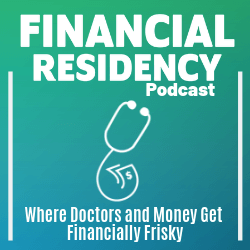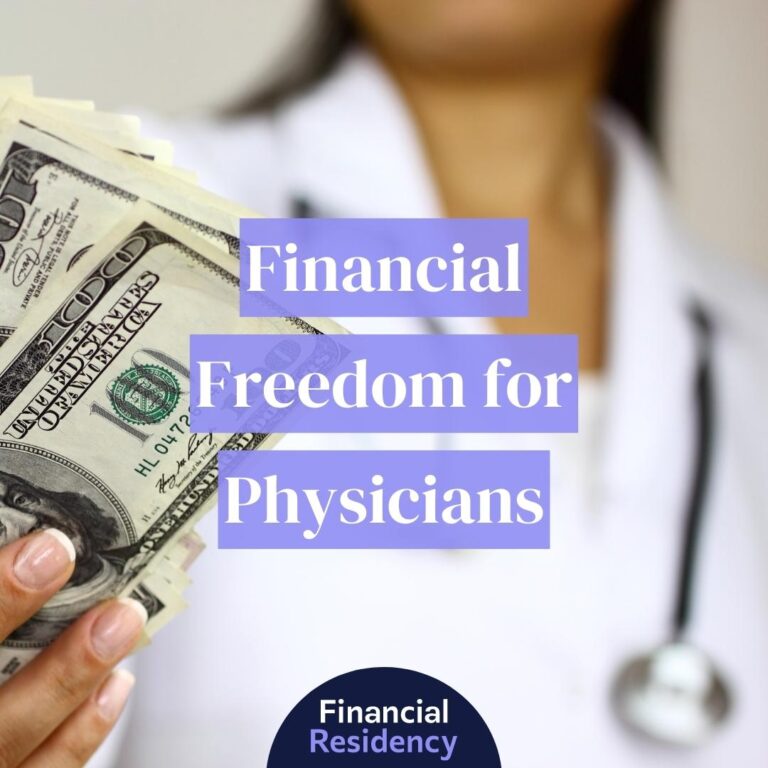Wouldn’t it be wonderful if we could hit the rewind button and have a chance to make different choices, especially when it comes to finances?
But we know life happens, and there’s definitely no such thing as a rewind button. We don’t always make perfect financial decisions and sometimes we aren’t aware of all the options available to us at the time.
Somewhere along the way, you decided you didn’t need to learn how to budget, or it was ok to continue to go further into debt. Maybe you thought you would be ok to purchase a home you really can’t afford while sending all your children to pricey private schools.
 It’s easy to see how physicians can find themselves in this predicament. You spend years scraping by during med school and training, as you continue to pile on the massive loans. Then, you finally make it through the lean years and your salary has quadrupled. Around the same time, you’re building a life for yourself, perhaps expanding your family and making much larger purchases.
It’s easy to see how physicians can find themselves in this predicament. You spend years scraping by during med school and training, as you continue to pile on the massive loans. Then, you finally make it through the lean years and your salary has quadrupled. Around the same time, you’re building a life for yourself, perhaps expanding your family and making much larger purchases.
But there’s a tipping point – your salary can only take you so far. Eventually, you have to make changes if you want to achieve your financial goals such as being debt-free or building your net worth.
No matter what decisions you’ve made about your finances up to this point, it’s never too late to start cultivating new, productive financial habits. If this describes you, then you’re already taking positive steps forward by reading this information.
It’s true, physicians get a late start compared to other professions. Physicians also have to invest more in their education and training than other professions. But even with these challenges, there are principles you can put into place no matter how late of a start you’re getting.
Identify the Behaviors
It may seem counterintuitive to tie emotions with money, but there is definitely a connection. Our financial decisions are tied to our attitudes towards money. If you want to make a change to your financial picture, both short-term and long-term, you need to understand how you got to this point.
Fear is a Motivator
There are several factors which could drive your current behaviors with money. It could be how you were raised to treat money. You could be influenced by your family when it comes to savings and investing (or lack thereof).
Maybe your whole life you’ve seen people around you scrape by, using credit cards to pay for emergencies or even everyday purchases. There’s just “never enough” and it causes financial decisions to be made out of fear and panic.
We can’t blame everything on our parents though! You could have a serious fear of missing out on the latest and greatest gadgets or cars, or whatever you can imagine. FOMO is real and it could be causing you to purchase too many big ticket items on a whim and without careful consideration.
You could also be afraid you will never grasp the concept of money management, therefore why even bother to learn the principles? While there is certainly an overwhelming amount of information available – including an equal amount of opinions – you can’t let this keep you from learning.
Lifestyle Inflation
You will see the reference to “lifestyle inflation” and “lifestyle creep” quite often at Financial Residency, and hear it mentioned in the podcasts, too. Lifestyle inflation refers to the tendency of physicians to rush into making all the upgrades in their life once their earnings hit full potential. This could come in the form of cars, homes, clubs, vacations, you name it.
Lifestyle creep will end up getting in your way of achieving financial independence. As long as you’re purchasing the fancy cars and gigantic housing, it’ll be tough to focus on paying off debt and saving for the future.
Education is Key
It would be worth your time to understand what drives you to make financial choices the way you do. There are numerous resources, such as books and podcasts, which can help identify your attitude and actions towards money. Find out who’s opinion you trust, and start learning little by little.
Granted, you can’t undo the past, but you can certainly learn from experiences and then move on to make better choices. You can start by investing a little time each week to understand a bit more about money management. It won’t be long before you’ll see the payoff, as you become more confident in your financial decision making.
Learn How to Budget
A budget isn’t anything new or groundbreaking. But there’s a reason you hear personal finance experts recommend a budget – when done correctly, they have a positive impact on financial decision-making. The bottom line is, a budget is a must.
Get Into the Details
The number one thing you can do is take a detailed look into your monthly spending. Track every single expense against your account and every single amount coming in. You can do this with pen and paper, a google doc, a spreadsheet, an app – whatever method you prefer.
I personally use the How to Cleanup Your Finances
Your financial well-being can’t change overnight, but it can improve over time. Eventually, the changes you make, whether big or small, will add up and free up more money to put towards your financial goals. Here are a few things you can do, which you’ll reap the benefit almost immediately. One of the best financial decision you can make is to automate your expenses, as well as your savings. Not only will you pay your bills on time (and avoid late fees), but you’ll make your life that much easier. By paying everything on time and consistently, you’ll also have a positive impact on your credit score. You can also automate your savings so each time you get paid, you can build up your emergency fund or retirement account without even thinking. I guarantee you will not miss what you never see. Take it one step further and figure out a way to set up individual accounts for your annual expenses, such as HOA dues, or the family vacation. Take the yearly amount and divide it up over 12 months, then put this amount into an account each month. Within 12 months, you’ll have the cash to pay for this expense – and it doesn’t hurt your wallet nearly as much. Admittedly some of you reading this aren’t comfortable in the kitchen. That’s ok, you don’t have to be a gourmet cook to learn how to eat less expensively at home. The best thing to do is come up with a handful of recipes you can easily throw together. You can use ingredients you usually have on hand and you don’t have to waste a lot of time planning. You can spend a few minutes during the week to plan out your meals. Even if it’s a jar of spaghetti sauce and noodles. If you plan it out and make a list, then you’ll lessen your chances of having to order pizza at the last minute. When you learn to eat at home more often, it will likely mean more trips to the grocery store (instead of your favorite takeout). When you’re at the grocery store, there are numerous ways you can save. First and foremost, don’t go shopping when you’re hungry! If your stomach is growling, it will only lead you to make impulsive decisions at the store. Instead, fill up prior to your trip so you’re not tempted to buy a cart full of bakery items. As much as you love your little darlings, don’t take your children to the store with you, if at all possible. Not only will they distract you from making smarter choices, but they’ll also beg you to buy every single item which has a cartoon character on it. Avoid this trap and leave them at home. You can also spend a few minutes a week looking at specials at the store. You may not have time to clip a ton of coupons, but you can stock up on sale items when they come around. FYI, most items go on sale every 4-6 weeks. So stock up when the prices are low and then purchase it again when the item is on sale again. With the same tenacity you used to negotiate your contract for work, you should apply similar principles to your monthly expenses. Most likely you are overpaying for cable, internet, cell phone, and maybe even one or two utilities. How much could you save by picking up the phone and telling them you’re going to walk away if they can’t improve their rate. This day in age, there are lots of choices for consumers. Use this to your advantage and get your rates lowered. Many of you are under the crushing burden of student debt. You won’t be able to achieve your goals if you can never chip away at this amount and become debt-free. It could be time to consider refinancing your private student loans. It’s possible to get a lower interest rate, which means you’ll be able to get out of debt even sooner. It might not help you immediately with a monthly payment, but you’ll pay less in interest over the life of the loan. You may get to a point where you’ve trimmed your expenses as much as possible. You’ve canceled your subscriptions, you’ve quit eating out, you’ve even learned how to mow your own grass again. Yet the money is still tight. You could be making $300K a year and feel as if you’re just as broke as you were in college. This is where you have to look back at your monthly spending and compare it to your overall financial goals. If you’re goal is to pay off debt sooner, retire earlier – or maybe even both – then you’re going to have to do more than negotiate a lower cell phone bill. Take a look at your biggest monthly expenses. Most likely the biggest items for you are mortgage/rent, student loans, daycare and/or education. What can you do to impact these big categories, which are stretching your budget paper thin? I’m going to warn you, these ideas aren’t popular. Your friends and family might not understand your motivation. But it’s going to take sacrifices to get yourself on the path to achieving your goals. Although not immediate, you could see real benefits by making big changes to your circumstances. You could move to a less expensive city. Is this an easy choice? Not at all. But living in a different city can affect multiple aspects of your life. You could save on housing, taxes, food, gas, disability insurance, and childcare. There are many advantages to moving to a more affordable zip code. You could choose to practice in a setting where you pay less in malpractice and earn a higher salary. Your spouse or partner could go back to work (remember the comment about this not being a popular idea?) This decision could be difficult if you have young children and would need to figure out childcare. But if there’s a way you can balance affordable childcare with a spouse’s additional income, then this could make a big difference to your bottom line. Speaking of vacations, stop taking 2 or 3 trips a year. Learn to go to places closer to home instead of flying all over the country. You can stay in decent places which may not be 5-star, but it won’t put you further in the hole either. Agree to take on locums work during your scheduled vacation time. If you are allowed 3 or 4 weeks of vacation time per year, consider using this time for locums work (instead of the pricey beach or ski vacation). Use the time to earn a nice chunk of money and apply the earnings towards your debt or savings. You could get creative with childcare. Do you have any family members close by who could help you out during the week? Could you figure out a part-time child watch situation, versus paying someone Monday-Friday? Get rid of your Whole Life Insurance. There is a very small (and by small we are talking almost non-existent) percentage of people who should carry whole life insurance. For the majority of physicians, a term life policy is going to give you the coverage you need. Yes, I’m sure you were told how your whole life insurance is an investment. It’s not an investment though – it’s an unnecessary monthly expense which basically serves to pay your salesperson’s commission. It can be hard to hear this, but if you are looking for ways to cut your overspending, then this is an area you need to look into. A term life insurance policy should be more than adequate to cover what you need, and it’s a fraction of the cost each month. Find An Advisor who feels as invested in your financial well-being as you do. This isn’t going to be easy, especially if your current advisor is someone you know personally. You have to remember, most advisors are also paid by selling you additional financial products. This financial advice isn’t free either. You’re getting charged a percentage to use this advisor. An alternative would be to hire a fee-only financial advisor. Instead of a percentage of your portfolio, you would be charged a flat rate (fully disclosed up front). You will receive advice for whatever area you need help making financial decisions – student loan payments, housing, budgeting, retirement – all of these topics can be covered. If you’re still reading this, then you’ve probably realized it’s going to take a few tough conversations and choices on your part. But if you’re tired of living paycheck to paycheck, even though you’re making a great salary, then you’re going to have to change your mindset and your circumstances. There’s never been a better time than right now to start making these changes.Learn to Automate
Learn to Cook
Learn to Look for Specials
Learn to Negotiate
Refinance Your Loans
Learn to Make Tough Financial Decisions

Change Your Circumstances
Time to Make New Financial Decisions





